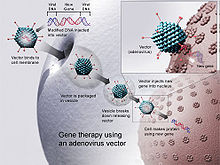Gene therapy

Gene therapy (also called human gene transfer) is a medical field which focuses on the utilization of the therapeutic delivery of nucleic acids into a patient's cells as a drug to treat disease. The first attempt at modifying human DNA was performed in 1980 by Martin Cline, but the first successful nuclear gene transfer in humans, approved by the National Institutes of Health, was performed in May 1989. The first therapeutic use of gene transfer as well as the first direct insertion of human DNA into the nuclear genome was performed by French Anderson in a trial starting in September 1990. It is thought to be able to cure many genetic disorders or treat them over time.
Between 1989 and December 2018, over 2,900 clinical trials were conducted, with more than half of them in phase I. As of 2017, Spark Therapeutics' Luxturna (RPE65 mutation-induced blindness) and Novartis' Kymriah (Chimeric antigen receptor T cell therapy) are the FDA's first approved gene therapies to enter the market. Since that time, drugs such as Novartis' Zolgensma and Alnylam's Patisiran have also received FDA approval, in addition to other companies' gene therapy drugs. Most of these approaches utilize adeno-associated viruses (AAVs) and lentiviruses for performing gene insertions, in vivo and ex vivo, respectively. ASO / siRNA approaches such as those conducted by Alnylam and Ionis Pharmaceuticals require non-viral delivery systems, and utilize alternative mechanisms for trafficking to liver cells by way of GalNAc transporters.
The concept of gene therapy is to fix a genetic problem at its source. If, for instance, in an (usually recessively) inherited disease a mutation in a certain gene results in the production of a dysfunctional protein, gene therapy could be used to deliver a copy of this gene that does not contain the deleterious mutation, and thereby produces a functional protein. This strategy is referred to as gene replacement therapy and is employed to treat inherited retinal diseases.
While the concept of gene replacement therapy is mostly suitable for recessive diseases, novel strategies have been suggested that are capable of also treating conditions with a dominant pattern of inheritance.
Not all medical procedures that introduce alterations to a patient's genetic makeup can be considered gene therapy. Bone marrow transplantation and organ transplants in general have been found to introduce foreign DNA into patients. Gene therapy is defined by the precision of the procedure and the intention of direct therapeutic effect.
Comments
Post a Comment